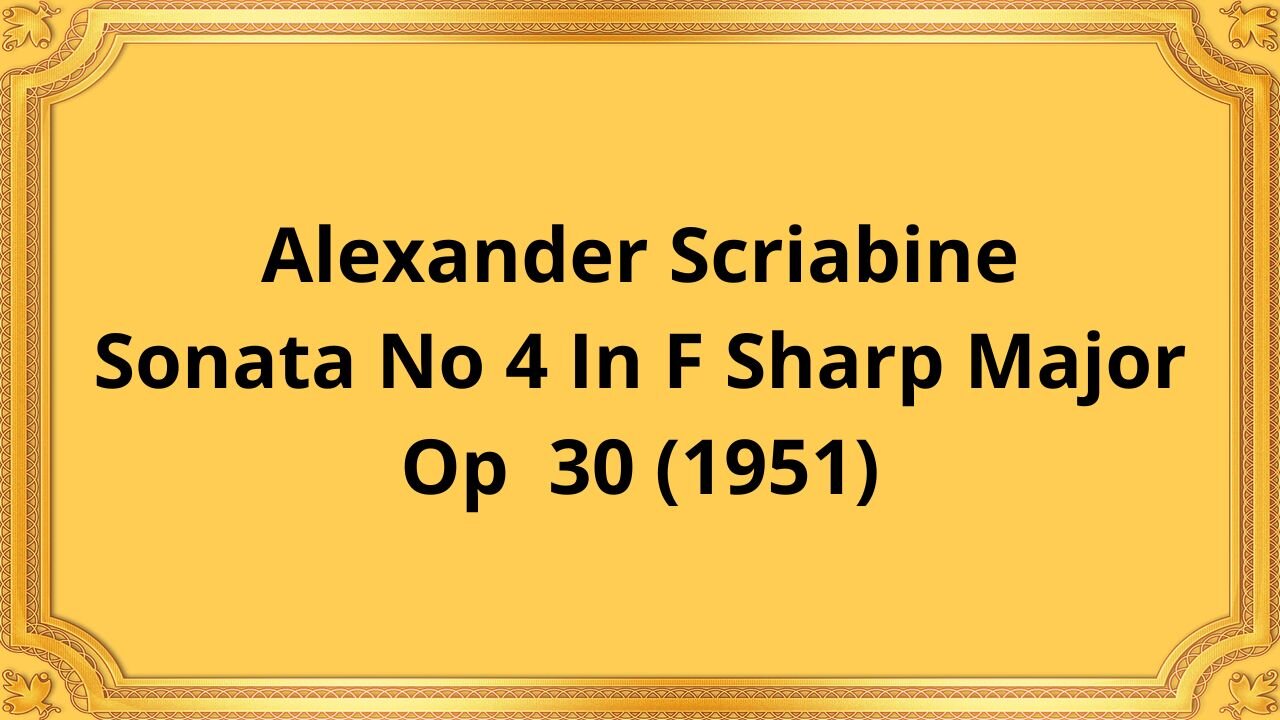Premium Only Content

Alexander Scriabine Sonata No 4 In F Sharp Major, Op 30 (1951)
#ClassicalMusic #AlexanderScriabin #SonataNo4 #FSMajor #Op30 #MusicalComposition #RussianComposer #RomanticEra #PianoMusic
#MusicTheory
Publication date 1951
ZADEL SKOLOVSKY PIANO
Alexander Scriabin's Sonata No. 4 in F Sharp Major, Op. 30, stands as a remarkable composition in the realm of classical music. Written by the Russian composer Alexander Scriabin, this piece showcases his unique style and expressive capabilities.
Composed in 1903, during the late Romantic era, Sonata No. 4 reflects Scriabin's transition from his earlier Chopin-inspired works towards a more experimental and visionary style. Scriabin was known for his innovative approach to harmony and his fascination with synesthesia, a condition in which senses overlap. These influences are evident in this composition, as it exhibits a heightened sense of expression and tonal exploration.
Sonata No. 4 follows the traditional three-movement structure commonly found in classical sonatas. The first movement introduces the main themes and establishes the tonal center of F Sharp Major. Scriabin's use of chromaticism and intricate melodic lines creates a sense of tension and anticipation. The second movement, marked as a scherzo, displays a contrasting character with its playful and rhythmic nature. Finally, the third movement brings the sonata to a powerful conclusion, with an intense and emotionally charged finale.
One of the most distinctive features of Sonata No. 4 is Scriabin's innovative harmonic language. He pushes the boundaries of tonality, incorporating dissonance, unconventional chord progressions, and unexpected modulations. This experimentation creates a sense of restlessness and unease, perfectly capturing the emotional depth of the piece. Scriabin's use of lush and expressive melodies further adds to the overall complexity and beauty of the composition.
Scriabin's Sonata No. 4 is a deeply emotional work that evokes a wide range of feelings within the listener. From moments of melancholy and introspection to bursts of exuberance and passion, the piece takes the audience on a transformative journey. Scriabin's ability to convey his own emotions through music is truly remarkable, making this sonata a profound and personal experience for both the performer and the listener.
Sonata No. 4 showcases Scriabin's unique artistic vision and sets the stage for his later, more experimental works. His groundbreaking approach to harmony and expressive techniques would go on to influence many composers who came after him. Scriabin's exploration of synesthesia and his quest for a truly immersive and transcendent musical experience left an indelible mark on the world of classical music.
Alexander Scriabin's Sonata No. 4 in F Sharp Major, Op. 30, is a testament to the composer's innovative spirit and his ability to evoke profound emotions through music. With its rich harmonies, intricate melodies, and emotional depth, this composition continues to captivate audiences to this day. It stands as a shining example of Scriabin's unique style and serves as a reminder of the power of music to touch the human soul.
You have the opportunity to support the channel:
https://destream.net/live/RadSiarAl/donate
https://www.buymeacoffee.com/6355radsiaral
-
 20:26
20:26
Classical music_Music Inspiration
1 month agoJohann Sebastian Bach Orchestral Suite No. 2 in B minor, BWV 1066
902 -
 2:02:11
2:02:11
Inverted World Live
9 hours agoGiant Underground Blob Moving Toward NY | Ep. 85
45.9K20 -
 2:46:21
2:46:21
TimcastIRL
9 hours agoTexas GOP Greenlights ARREST WARRANTS For Dems Who FLED State | Timcast IRL
242K91 -
 3:16:50
3:16:50
Laura Loomer
9 hours agoEP137: EXPOSED: How Tucker Carlson Became Hunter Biden's Wingman
71.7K82 -
 4:22:34
4:22:34
Akademiks
8 hours agoNicki Minaj vs Dez Bryant. Trump Calls out Charlamagne. Diddy Denied Bail Again! ICEMAN soon?
57.2K3 -
 3:16:28
3:16:28
Nerdrotic
10 hours ago $9.32 earnedNerdrotic at Night 504
82.9K3 -
 8:20:30
8:20:30
Dr Disrespect
18 hours ago🔴LIVE - DR DISRESPECT - WARZONE - RANDOMLY GENERATED LOADOUTS EVENT
232K9 -
 1:36:07
1:36:07
Glenn Greenwald
12 hours agoTrump Admin Unleashes More Policies That Prioritize Israel Over American Citizens; The Smear Campaign Against Gaza Aid Whistleblower with Journalist Mel Witte | SYSTEM UPDATE #497
146K194 -
 58:14
58:14
MattMorseTV
10 hours ago $14.81 earned🔴Hakeem just lost EVERYTHING.🔴
84.4K63 -
 9:21:36
9:21:36
Rallied
14 hours ago $3.19 earnedWARZONE CHALLENGES WITH DRDISRESPECT & BOB
86K5